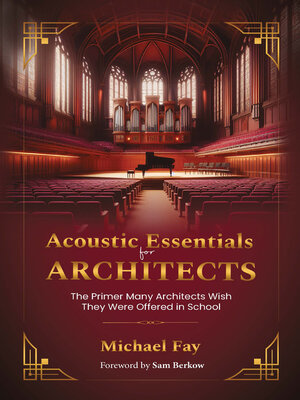Acoustic Essentials for Architects
ebook ∣ The Primer Many Architects Wish They Were Offered in School
By Michael Fay

Sign up to save your library
With an OverDrive account, you can save your favorite libraries for at-a-glance information about availability. Find out more about OverDrive accounts.
Find this title in Libby, the library reading app by OverDrive.



Search for a digital library with this title
Title found at these libraries:
| Library Name | Distance |
|---|---|
| Loading... |
Acoustics is a vital but often overlooked part of architecture. It is frequently misunderstood or not even offered in most architectural schools, so many architects do not receive the practical training necessary to maximize their designs. With this education gap in mind, Acoustic Essentials for Architects is the primer architects need to fill the void.
Written by an industry veteran with 45 years of hands-on experience in a low-tech, conversational style, it will help architects better understand and visualize the relationship between the physical shapes, textures, and dimensions of their work and how those design decisions impact the qualitative behavior of sound. This peer-reviewed book details the essential terminology and concepts of architectural acoustics, including why it' s so important to understand the incredible dimensional range of wavelengths between the lowest and highest audible sounds, the feasibility aspects of applied acoustics, and the trade-offs to blending architecture, acoustics, and pragmatism. It also explains the importance of interior seating symmetry for medium and large rooms and optimizing for speech intelligibility. With the information provided, architects can improve their designs by shifting from unintentional acoustical results to those that achieve a planned outcome.
Written by an industry veteran with 45 years of hands-on experience in a low-tech, conversational style, it will help architects better understand and visualize the relationship between the physical shapes, textures, and dimensions of their work and how those design decisions impact the qualitative behavior of sound. This peer-reviewed book details the essential terminology and concepts of architectural acoustics, including why it' s so important to understand the incredible dimensional range of wavelengths between the lowest and highest audible sounds, the feasibility aspects of applied acoustics, and the trade-offs to blending architecture, acoustics, and pragmatism. It also explains the importance of interior seating symmetry for medium and large rooms and optimizing for speech intelligibility. With the information provided, architects can improve their designs by shifting from unintentional acoustical results to those that achieve a planned outcome.







